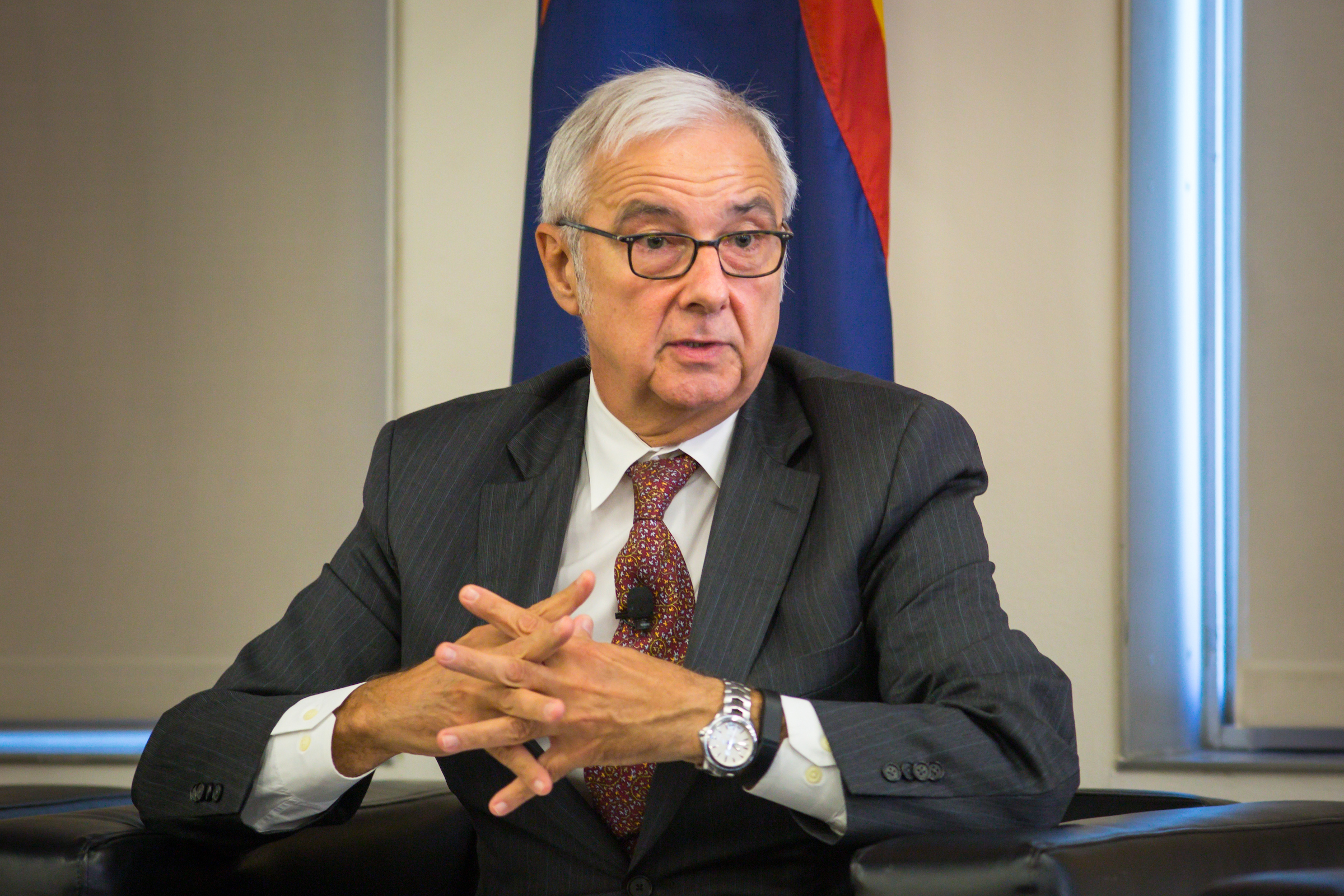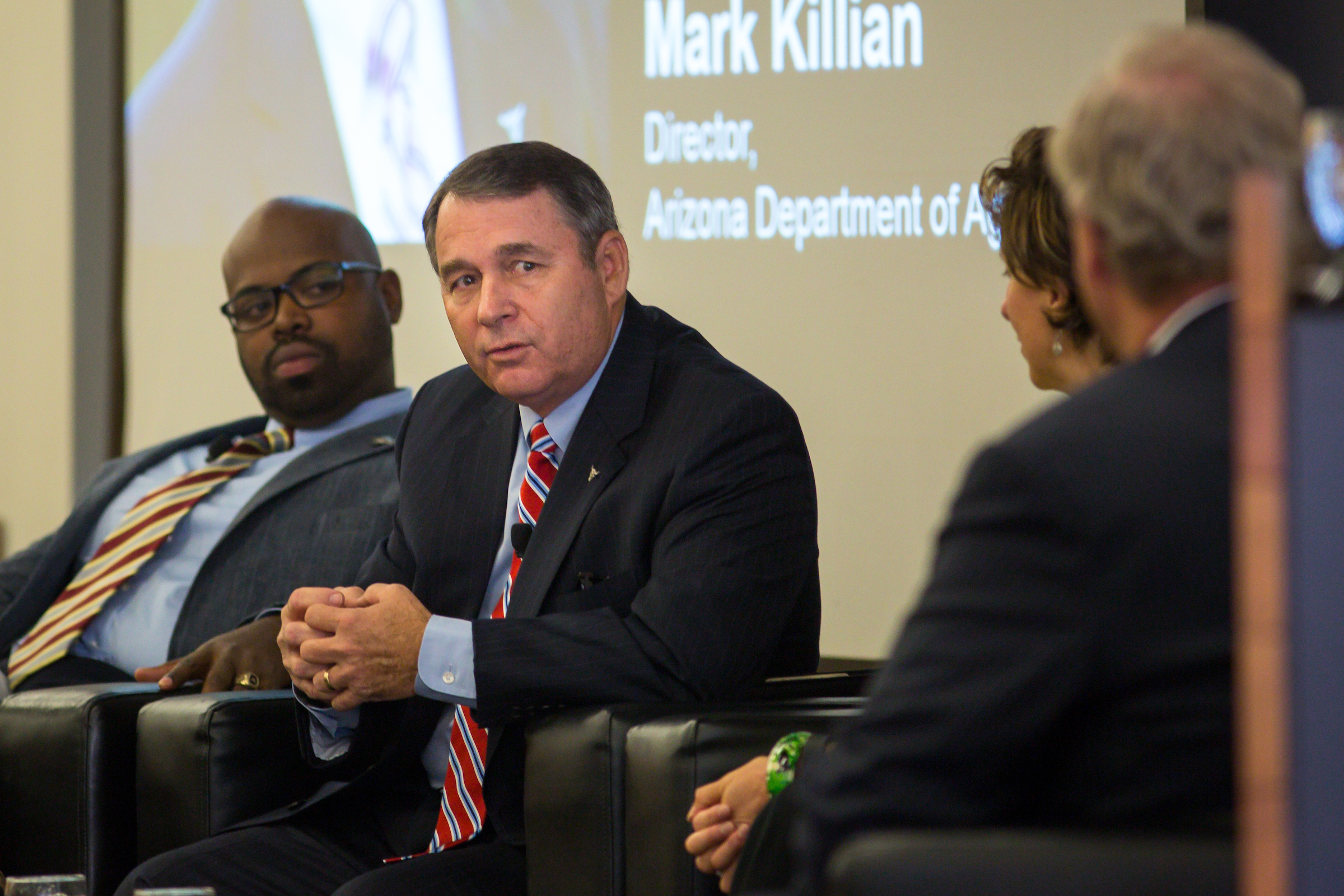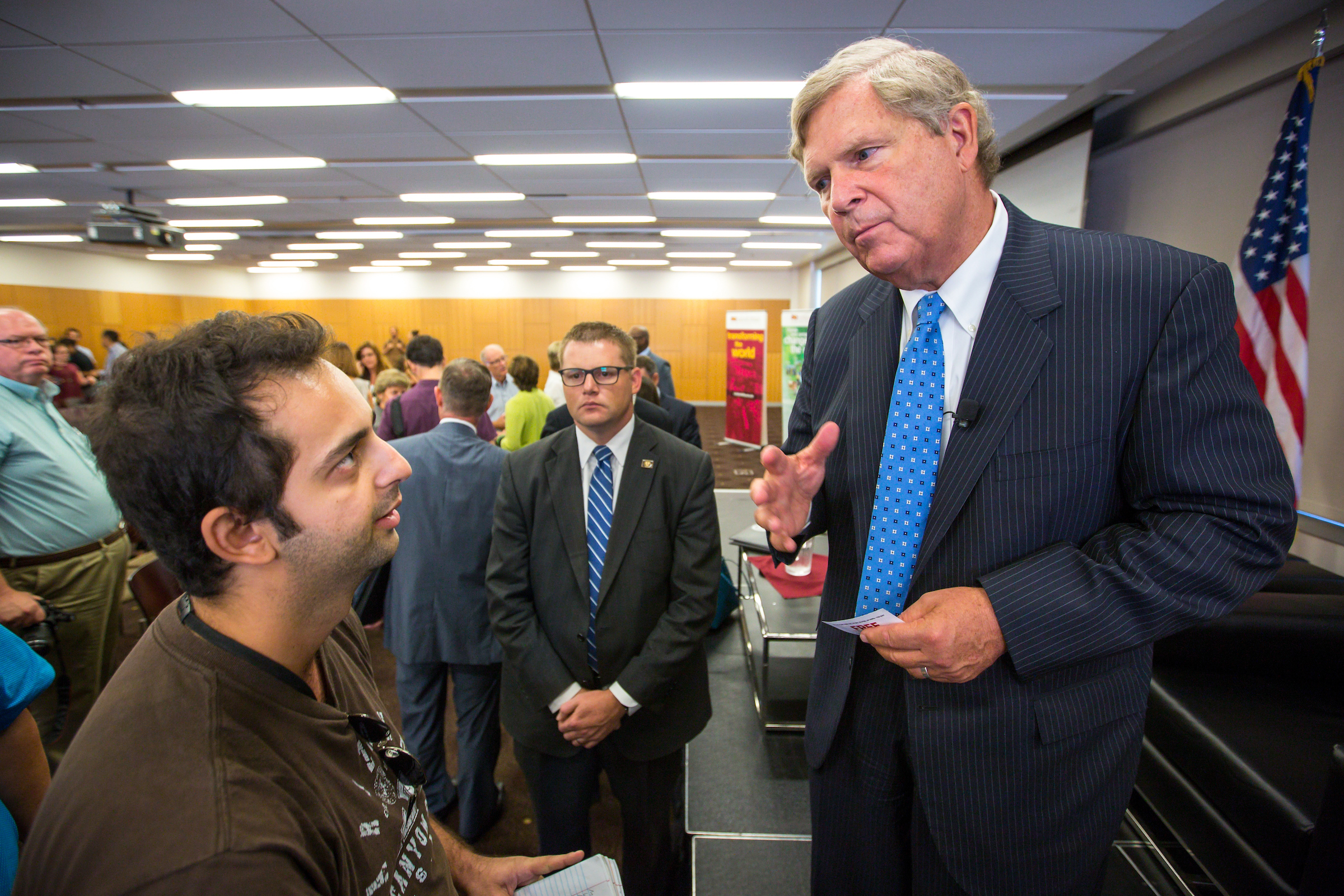Vilsack: Universities vital to helping farmers survive climate change

Food security is vital to America’s freedom, and protecting farmers from the effects of climate change will require the collaboration of universities, the U.S. secretary of agriculture said.
Tom Vilsack, who has been the nation’s ag chief for the entirety of the Obama administration, spoke at Arizona State University on Wednesday about the impact of climate change on farming and ranching. The Fall Forum event was sponsored by the Julie Ann Wrigley Global Institute of Sustainability at ASU.
“In my lifetime, we’ve seen a 170 percent increase in agricultural productivity,” Vilsack said, noting that Americans spend about 10 percent of their paychecks on food, compared with 25 to 50 percent in other countries.
“We are a food-secure nation,” Vilsack said. “China can’t say that. Russia can’t say that.
“That’s why it’s important to talk about the future that will exist with a changing climate.”
Besides drought, other possible effects of climate change could be increases in pests and livestock diseases, more frequent and severe storms and more firesThe U.S. Forest Service, overseen by the USDA, has seen the money it spends on fire suppression mushroom from 16 percent of its budget a decade ago to 56 percent now, which means less money for restoration and resiliency efforts in forests, Vilsack said..
Vilsack said the Obama administration has charged universities with doing more research on climate and water issues as well as specific solutions such as grazing patterns and drought-resistant crops.
“Arizona State is working with our ‘climate hub’ in New Mexico, looking at every aspect of climate change and doing assessments” to give technical support to farmers, ranchers and forest landowners, he said.
The Julie Ann Wrigley Global Institute of Sustainability has several projects that address climate change and agriculture, including the “One Million Tons” project, which is creating data on the use of adaptive multi-paddock grazing for carbon sequestration, water retention and plant and microbial biodiversity. That project also includes outreach to ranchers and farmers and agricultural policy development.
Osvaldo Sala, a professor in the School of Sustainability, said during the panel discussion that universities should help find evidence-based solutions. Photo by Charlie Leight/ASU Now
After his speech, Vilsack moderated a forum on sustainability that focused on the importance of collaboration among governments, corporations, conservationists and universities. The panel featured Osvaldo Sala, the Foundation Professor and Julie A. Wrigley Chair at ASU, where he contributes to both the School of Life Sciences and the School of Sustainability. His research has predicted that climate change will result in big variations from year to year, with very dry periods alternating with very wet periods.
Sala said that climate researchers used to think their stakeholders were primarily ranchers, but now they realize their work is important to people who are interested in conservation, recreation, job creation and other issues.
“We hope the universities would provide the knowledge to shift from the emotion-driven confrontations that we’re seeing in the news every day to an evidence-based negotiation,” he said, citing the ongoing conflict over the Dakota Access pipeline in North Dakota, which is conflicting the interests of Native Americans, conservationists, an oil company and a local community.
Mark Killian, director of the Arizona Department of Agriculture, said that universities have made huge contributions to the advancement of agriculture. Photo by Charlie Leight/ASU Now
Mark KillianKillian also is a former member of the Board of Regents, a state legislator and director of the Arizona Department of Revenue. His family has been in farming and ranching in Arizona for more than 100 years. He graduated from ASU in 1981., director of the Arizona Department of Agriculture, said that the knowledge produced at universities has helped keep America free.
“That creation of knowledge on the ground has transformed American agriculture from subsistence levels to the greatest producer in the world today. To my mind, agriculture is the most important strategic industry we have.
“The countries that can feed themselves are free.”
Killian said that universities have created improvements in everything from water-saving irrigation nozzles to crop genetics.
Department of Agriculture Secretary Tom Vilsack speaks briefly with BioDesign PhD student Thiago Barbosa on Wednesday, Sept. 14, at the Memorial Union.
Vilsack said that young people today have the opportunity to redefine the American economy.
“We talk about bringing manufacturing back. We have the capacity to have a plant-based economy. We already have a $360 billion industry of making chemicals and fibers that are plant based. There’s unlimited possibility to convert an economy that has for too long been dependent on fossil fuels.”
Killian said that the challenge for today’s university students is to avoid partisanship and work together.
“We have people who go to bed hungry. How can anyone in America today go to bed hungry? Feeding people, from a moral standpoint, is one of the most important things we do in the world.
“If you focus on that, solutions will come together quickly.”
Top photo: U.S. Secretary of Agriculture Tom Vilsack spoke at the Fall Forum, sponsored by the Julie Ann Wrigley Global Institute of Sustainability at ASU. Photo by Charlie Leight/ASU Now.
More Environment and sustainability

The mighty impact of insects
By Meghan Finnerty and Megan NeelyArizona State University has a lot of insects — and for good reason. A colony of researchers is studying how social insects can be used as tools to answer…

Majority of American religious leaders silently believe in climate change, ASU study shows
Many Americans turn to religious leaders for guidance on matters of faith and morality.With this in mind, a new study, led by a researcher from Arizona State University, suggests that congregations…

A new university prototype for a thriving world
The challenges for our world’s health and the future of humanity and other life-forms command urgency — and the university is accelerating its wide-reaching collaborative work to help keep the planet…




